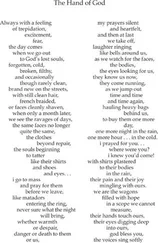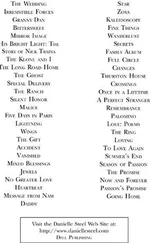Danielle Steel - Echoes
Здесь есть возможность читать онлайн «Danielle Steel - Echoes» весь текст электронной книги совершенно бесплатно (целиком полную версию без сокращений). В некоторых случаях можно слушать аудио, скачать через торрент в формате fb2 и присутствует краткое содержание. Год выпуска: 2005, ISBN: 2005, Издательство: Random House, Inc., Жанр: Старинная литература, на английском языке. Описание произведения, (предисловие) а так же отзывы посетителей доступны на портале библиотеки ЛибКат.
- Название:Echoes
- Автор:
- Издательство:Random House, Inc.
- Жанр:
- Год:2005
- ISBN:9780440240785
- Рейтинг книги:4 / 5. Голосов: 1
-
Избранное:Добавить в избранное
- Отзывы:
-
Ваша оценка:
- 80
- 1
- 2
- 3
- 4
- 5
Echoes: краткое содержание, описание и аннотация
Предлагаем к чтению аннотацию, описание, краткое содержание или предисловие (зависит от того, что написал сам автор книги «Echoes»). Если вы не нашли необходимую информацию о книге — напишите в комментариях, мы постараемся отыскать её.
Echoes — читать онлайн бесплатно полную книгу (весь текст) целиком
Ниже представлен текст книги, разбитый по страницам. Система сохранения места последней прочитанной страницы, позволяет с удобством читать онлайн бесплатно книгу «Echoes», без необходимости каждый раз заново искать на чём Вы остановились. Поставьте закладку, и сможете в любой момент перейти на страницу, на которой закончили чтение.
Интервал:
Закладка:
“I don't want you going to lectures like the ones Edith Stein gave, Amadea, or rallies organized by radicals, if that's what you're doing these days. And you should be careful about speaking up against Hitler's policies, except here.”
“Do you agree with him, Mama?” Amadea looked shocked.
“No, I don't.” Beata felt as though her head were clearing, finally, and it was interesting talking to Amadea. She was an extremely bright young girl. It reminded her of her own questioning at that age, and her passion for philosophy and political discussions. She had spent hours arguing with her brothers and their friends. Amadea had no one to talk to about things like that except her. “But it's dangerous to be oppositional. There's a lot of anti-Semitism in Hitler's policies. Even at your age, you could bring attention to yourself by speaking out. That could be dangerous for you.” Amadea could see that her mother was serious, and Amadea made a comment about how disgusting it was that they had burned books in May. Amadea didn't like the things she was seeing and hearing publicly, and when she paid attention to them, neither did her mother.
“Why did they burn books?” Daphne entered the conversation finally, and looked confused.
“Because they're trying to frighten people and intimidate them,” Amadea volunteered. “And they're sending people to work camps because they're Jewish. The Nazis told people not to go to Jewish shops on my birthday this year.”
“Because of you?” Daphne looked startled by what Amadea had said to her, and her older sister smiled at her.
“No, it was just a coincidence, but it was still a mean thing to do.”
“Do Jewish people look different than other people?” Daphne asked then with interest, and Amadea looked outraged.
“Of course they don't. How can you say a thing like that?”
“My teacher said that Jews have tails,” Daphne said innocently as both her mother and sister looked horrified.
“That's not true,” Beata said, wondering if she should tell them that she had been born Jewish, but she felt awkward telling them now. She had been a Catholic for so many years. And some people said they were only going after the poor Jews, the homeless and criminals, not the ones like her family. The Nazis wanted to clean up Germany and disperse the criminal element. They would never go after respectable Jews. She was sure of that. But still not sure enough to tell her children she'd been Jewish.
It was an interesting conversation at the dinner table that night, and they lingered longer than usual. Beata had never realized how politically interested Amadea was, how socially conscious and independent. Nor had she realized that she was struggling to decide if she had a religious vocation, which she found far more disturbing than her more radical inclinations. She couldn't help wondering just how influenced by Edith Stein's lectures and writings she had been. Or worse yet, by the fact that Stein had become a nun. Things like that were powerful influences on a young girl. Not to mention the older sister of her best friend. Altogether it painted a portrait of a life Beata didn't want for her. But she herself had offered little to put any weight on the other side of the scale in recent years. She had no social life, no friends, saw no one except the Daubignys, and them rarely. For eleven years while Antoine was alive, she had devoted all her time to him and her children. And since his death, she had become a recluse. She saw no way of changing that now, and had no desire to. But at least she could pay more attention to what was happening in the world. Amadea seemed far better informed than she. She worried about her opinions about the Nazis' anti-Semitism, though, and hoped she wasn't voicing them in school. She reminded her to be careful when she left for school the next day. Disagreeing with the Nazis was a dangerous thing to do, at any age.
The following week Beata went back to the synagogue. She didn't want to wait another year before she saw her mother again. This time she sat just behind her purposely, and there was no need to lift her veil. Her mother recognized her the moment she saw her, and as they left after the service, Beata slipped a piece of paper into her mother's gloved hand. It had her address and phone number on it, and as soon as she had given it to her, and saw her mother close her fingers over it, Beata disappeared into the crowd and left. She didn't wait to see her father this time. All she could do now was pray that her mother would be brave enough to call. Beata wanted desperately to see her and hold her and talk to her again. More than anything, she wanted her to meet the girls.
It was an agonizing two days. By sheer coincidence, Amadea answered the phone when it rang. They were just leaving the table after dinner, and Beata had just asked Daphne if she wanted to play a game. Amadea had noticed that her mother seemed much better these days, and was making more effort to engage them, or emerge from her long depression after Antoine's death.
“There's someone on the phone for you,” Amadea told her.
“Who is it?” Beata asked, momentarily forgetting the call she was expecting, and assuming it was Véronique. She had been asking Beata for months to make a dress for her for their Christmas party. She thought it would be good therapy for her. But Beata had been avoiding her. She hadn't sewn now in years, not since Antoine's death, except once in a great while, something simple for the girls. She no longer had any interest in making evening gowns or serious dresses. And she no longer had the need financially.
“She didn't say who she was,” Amadea explained, as she took Daphne upstairs, and Beata walked to the phone.
“Hello?” Beata answered, and her breath caught when she heard the voice. It hadn't changed.
“Beata?” she whispered, afraid someone might overhear. Jacob was out, but everyone knew she wasn't allowed to speak to her daughter. She was dead.
“Oh my God. Thank you for calling. You looked so beautiful at the synagogue. You haven't changed.” After seventeen years, they both knew that wasn't possible. But to Beata, she looked the same.
“You looked so sad. Are you all right? Are you ill?”
“Antoine died.”
“I'm so sorry.” She sounded genuine. Her daughter had looked destroyed. It was why she had called. She couldn't turn her back on her any longer, no matter what Jacob said. “When?”
“Six years ago. I have two beautiful little girls. Amadea and Daphne.”
“Do they look like you?” Her mother smiled as she asked.
“The little one does. The older one looks like her father. Mama, would you like to see them?”
There was an interminable silence, and then she answered finally, with a sigh. She sounded tired. Things were difficult these days. “Yes, I would.”
“That would be so wonderful.” Beata sounded like a girl again. “When would you like to come?”
“What about tomorrow afternoon, for tea? The girls would be home from school then, I assume.”
“We'll be here.” There were tears rolling down Beata's cheeks. This was what she had prayed for for years. Forgiveness. Absolution. Touching her mother again. Just once. Holding her. A moment in her mother's arms. Just once.
“What will you tell them?”
“I don't know. I'll figure it out tonight.”
“They'll hate me, if you tell them the truth,” Monika Wittgenstein said sadly. But just as Beata wanted to see her, Monika wanted to see her own child again. And these days bad things were happening. Jacob was afraid that one day it could happen to them, too, although Horst and Ulm said that could never happen. They were Germans, not just random Jews roaming the streets. They said the Nazis were after the criminal element, not respectable people like them. Jacob didn't agree. And they were all getting old. She needed to see her daughter again. Needed to. Viscerally. Like a part of her heart that had been taken from her and needed to be restored.
Читать дальшеИнтервал:
Закладка:
Похожие книги на «Echoes»
Представляем Вашему вниманию похожие книги на «Echoes» списком для выбора. Мы отобрали схожую по названию и смыслу литературу в надежде предоставить читателям больше вариантов отыскать новые, интересные, ещё непрочитанные произведения.
Обсуждение, отзывы о книге «Echoes» и просто собственные мнения читателей. Оставьте ваши комментарии, напишите, что Вы думаете о произведении, его смысле или главных героях. Укажите что конкретно понравилось, а что нет, и почему Вы так считаете.











